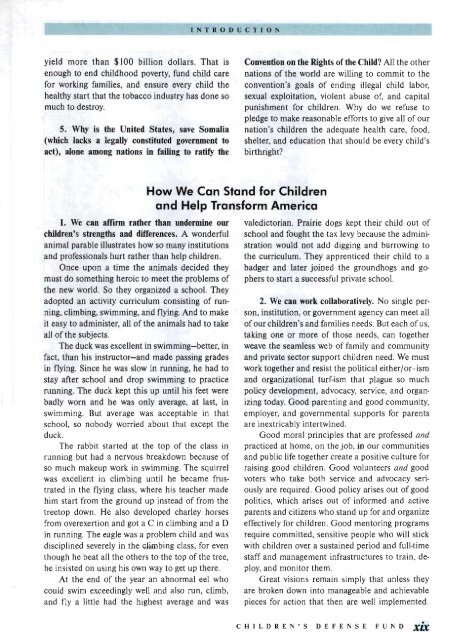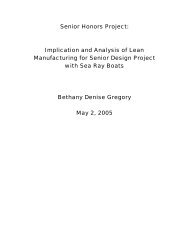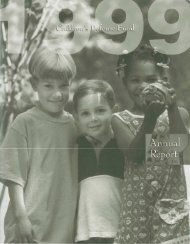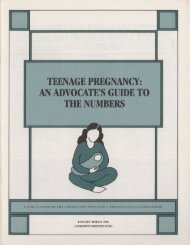child care - Digital Library Collections
child care - Digital Library Collections
child care - Digital Library Collections
You also want an ePaper? Increase the reach of your titles
YUMPU automatically turns print PDFs into web optimized ePapers that Google loves.
INTRODUCTION<br />
yield more than $100 billion dollars. That is<br />
enough to end <strong>child</strong>hood poverty, fund <strong>child</strong> <strong>care</strong><br />
for working families, and ensure every <strong>child</strong> the<br />
healthy start that the tobacco industry has done so<br />
much to destroy.<br />
5. Why is the United States, save Somalia<br />
(which lacks a legally constituted government to<br />
act), alone among nations in failing to ratify the<br />
Convention on the Rights of the Child? All the other<br />
nations of the world are willing to commit to the<br />
convention's goals of ending illegal <strong>child</strong> labor,<br />
sexual exploitation, violent abuse of, and capital<br />
punishment for <strong>child</strong>ren. Why do we refuse to<br />
pledge to make reasonable efforts to give all of our<br />
nation's <strong>child</strong>ren the adequate health <strong>care</strong>, food,<br />
shelter, and education that should be every <strong>child</strong>'s<br />
birthright?<br />
1. We can afIlfm rather than undermine our<br />
<strong>child</strong>ren's strengths and differences. A wonderful<br />
animal parable illustrates how so many institutions<br />
and professionals hurt rather than help <strong>child</strong>ren.<br />
Once upon a time the animals decided they<br />
must do something heroic to meet the problems of<br />
the new world. So they organized a school. They<br />
adopted an activity curriculum consisting of running,<br />
climbing, swimming, and flying. And to make<br />
it easy to administer, all of the animals had to take<br />
all ofthe subjects.<br />
The duck was excellent in swimming-better, in<br />
fact, than his instructor-and made passing grades<br />
in flying. Since he was slow in running, he had to<br />
stay after school and drop swimming to practice<br />
running. The duck kept this up until his feet were<br />
badly worn and he was only average, at last, in<br />
swimming. But average was acceptable in that<br />
school, so nobody worried about that except the<br />
duck.<br />
The rabbit started at the top of the class in<br />
running but had a nervous breakdown because of<br />
so much makeup work in swimming. The squirrel<br />
was excellent in climbing until he became frustrated<br />
in the flying class, where his teacher made<br />
him start from the ground up instead of from the<br />
treetop down. He also developed charley horses<br />
from overexertion and got a C in climbing and a D<br />
in running. The eagle was a problem <strong>child</strong> and was<br />
disciplined severely in the climbing class, for even<br />
though he beat all the others to the top of the tree,<br />
he insisted on using his own way to get up there.<br />
At the end of the year an abnormal eel who<br />
could swim exceedingly well and also run, climb,<br />
and fly a little had the highest average and was<br />
How We Can Stand for Children<br />
and Help Transform America<br />
valedictorian. Prairie dogs kept their <strong>child</strong> out of<br />
school and fought the tax levy because the administration<br />
would not add digging and burrowing to<br />
the curriculum. They apprenticed their <strong>child</strong> to a<br />
badger and later joined the groundhogs and gophers<br />
to start a successful private school.<br />
2. We can work coUaboratively. No single person,<br />
institution, or government agency can meet aU<br />
ofour <strong>child</strong>ren's and families needs. But each ofus,<br />
taking one or more of those needs, can together<br />
weave the seamless web of family and community<br />
and private sector support <strong>child</strong>ren need. We must<br />
work together and resist the political either/or-ism<br />
and organizational turf-ism that plague so much<br />
policy development, advocacy, service, and organizing<br />
today. Good parenting and good commuruty,<br />
employer, and governmental supports for parents<br />
are inextricably intertwined.<br />
Good moral principles that are professed and<br />
practiced at home, on the job, in our communities<br />
and public life together create a positive culture for<br />
raising good <strong>child</strong>ren. Good volunteers and good<br />
voters who take both service and advocacy seriously<br />
are required. Good policy arises out of good<br />
politics, which arises out of informed and active<br />
parents and citizens who stand up for and organize<br />
effectively for <strong>child</strong>ren. Good mentoring programs<br />
require committed, sensitive people who will stick<br />
with <strong>child</strong>ren over a sustained period and full-time<br />
staff and management infrastructures to train, deploy,<br />
and monitor them.<br />
Great visions remain simply that unless they<br />
are broken down into manageable and achievable<br />
pieces for action that then are well implemented.<br />
CHI L D R EN' S D E FEN S E FUN D xix














